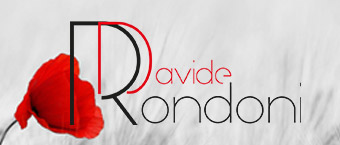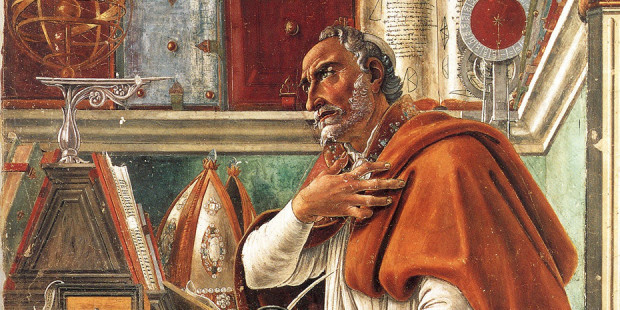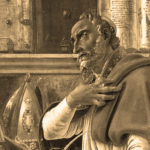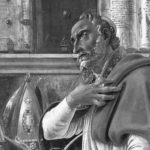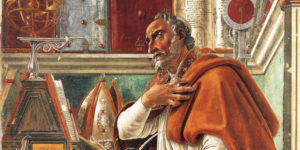
My first memory of Augustine is connected, I’m not sure why, with my mother’s bed. Perhaps I was flopped down on it when I read a few of his pages for the first time. It was on that same bed of my parents that I wrote my first verses at the age of eight. And then, I don’t know why, but I see Augustine linked to that bed as well.
Certainly I encountered him again later, when studying him at University under the extremely silly and extremely wise Professor Manferdini who always arrived to class with her shopping bags and was always newly moved by reading him, her philosopher and lover. But even more importantly, I saw him flicker and heard him murmur behind the pages of some of the poets I counted as friends and mentors. Luzi’s first collection, for example, is called “La Barca” and that amazed and aching vision of the young poet in the grips of time and the mystery of living was woven from a dialogue (not only in a metaphorical sense) with “the restless Bishop of Hippo.” The dialogue persisted in Luzi’s work and in some way got into me as well because I followed in the footsteps of that gentle Florentine with his plundering verses for some time. And then there is Augustine’s presence in Ungaretti’s brazilian lessons and in his angry, incendiary, excavated pages.
Is it possible that Ungaretti’s immense and upright love of Petrarch, of a “hard” Petrarch, does not vibrate within him with the same fascination that Augustine’s nostalgic soul exercises on him, Ungaretti, who claims to be a man of pain, a nomad? Life is nostalgia, sang this poet of “The Rivers” with words that he dug out of the abyss.
And Thomas S. Eliot, in his aching and intensely exact poetic knowledge in the Four Quartets -- and before, even before the Wasteland -- in that feverish and delicate investigation into the mystery of time, wanders far enough to invoke that “the fire and the rose are one.” He is crying out to Augustine from the first tremendous and vivid decades of the 20th century. Every poet who has entered into the mystery of verse and into its rich and obscure relationship with time has found the luminous shade of Augustine to converse with. Montale and Leopardi. Or to reverse the situation (thereby taking a risk that, given the material of poetry, isn’t even very risky), it could perhaps be said that Augustine purposely placed himself at a crossroads through which poets must inevitably pass.
He is the one who looked for that dialogue. And he looked for it, it must immediately be made clear, because the questions that occupied him concerned nothing less than the health of his soul, the soul of a man and a Christian. He could not avoid an encounter with the problem of poetry. The foot and the verse that are integral to poetry are always interesting for those who seek a path in life.
The element that struck me immediately about Augustine’s reflections is that they radiate outwards without ever losing the heat of that primary sun which is the dramatic point of his research and of his own personal case. The aesthetic experience and his comprehension of it were not simply the exercises of the good rector he was. They were also his way of understanding that “carme universalis” that is the only harmony worthy of the human heart, of its abyssal depths, of its spasm. Equaled by few great men, Augustine stands out immense, almost trembling in his vast, steep thought. Yet, in a certain sense he is, at the same time familiar, close. A couple of verses by my friend the French poet Jean Pierre Lemaire that I love recall the Augustinian tension: “there is music in the world/ but if you don’t sing you can’t hear it.” What song, then, positions us for that listening?
For Augustine the tension in perceiving the “carme universalis” was connected with the necessity of not remaining tied to an inferior pleasure. In the manner of one who settles for less. And Augustine was not that type. If we do not consider his search for a satisfaction that was forever further away, his relentless reflection on rhythm, on the art of composing music, and in general his reflections that today we would call “aesthetics,” we cannot comprehend his thought.
The so-called liberal arts are “sure steps,” as he says in the “Retractiones,” for arriving at an incorporeal reality beginning from corporeal things. Art is a “scientia” for re-uniting with the One. And thus, a terribly important concern. To stop at the “need” for liberal arts is a sign of weakness. It is a prophecy, if you will, of the situation in which we live: we need the liberal arts. But when their work of introducing us to a science of the invisible (that which was sought by Rafael, Leonardo, Michelangelo, or Lorenzo Lotto, as well as the icon painters) is subtracted from them, the arts become entertainment for the educated, or self-referential irony. They are forced into a continual provocation dedicated to tickling social consciousness or producing “ludus” in the rich zones of the planet.
The “numerus” to which Augustine dedicates vast and erudite pages of “De Musica” is a form that can be translated as: rhythm, number, music. The sensation that the sound offers us is the beginning of a journey. As an attentive reader of Augustine and his confession as a literary genre, Maria Zambrano would have called this ‘a dawn of thought.’ And Von Balthasar reads the beauty of the “Lay Styles” from Dante to Péguy with an eye to pointing out the continual references – as contact with Augustine but also as ways of going beyond him – in the great works from Dante Alighieri to Péguy. Beauty, for Augustine, is always a felt experience. The opposite of order is nothingness. Evil is like an ugly detail in a work of art. And it also depends on the fact that we experience life like a mosaic seen from too close; the whole design escapes us. Only God can see it, and we must therefore suffer this limitation. The world is like a work of art according to what is suggested in the “Book of Knowledge:” “Omnia in numero, mensura, pondere disposuisti.” Baudelaire thought the same thing.
The experience of beauty, Augustine knew, is a place of risk. His obscure vacillations on the subject of songs in the liturgy – and yet he loved Ambrogio – are the interior sign of this awareness.
The “theater” of human ability can obfuscate the evidence of the beauty of God’s work. It can even distract us from the tension of the One.
Beauty opens and launches the drama of liberty. This drama has, as its field, the entire human stature: senses, reason, memory. And he, steep man of thought and harsh convert, decided that no, not even in church could beautiful human singing be permitted. One should not allow the theater of human song where God is the protagonist. For Ambrogio, author of hymns, it was a matter of writing a “credo” in verses that was born of ruminations on the psalms. Augustine did not consider this acceptable. There was the risk for him that the “melos” would emerge as more important than the reality of prayer and the sacrament. And the church would risk becoming a theater of magic rites.
As a student of rhetoric he admired writers. But he speaks of being unmoved, reading the Christian writers, by what they have in common with the pagans. It is not eloquence that moves him, but what the Christians say. And he hopes that his eloquence will rise “like an unsummoned sister” from his breast – which is to say from the life – of the author. A tempered eloquence can produce delight, but the scope of this eloquence is not delight but persuasion.
The unsummoned sister. At the end of his acute stylistic analysis of the writing of Paolo and Gerolamo, Augustine concludes that he prefers the simple “naked” style. The praise should be directed towards the life, and the events of that life. He is stalking, by every possible means, complacency and fashion. The empty style of life.
And yet as his mother is dying, the memory of songs he heard in Milan is sweet in his destroyed heart. There is, after all, something good in those songs he had condemned. Experience wins over philosophy. Beyond the personal experience during the occasion of Monica’s death, it is the pastoral experience which mitigates in Augustine the “condemnation” of the beauty of song. He recognizes that his experience and that of the people are similar.
In the central fiery book of “De Musica,” the sixth, it is not by chance that Augustine reflects on how it’s possible that an experience of the senses, physical, corporeal, can offer something good to the soul that is superior to it. But this soul is “wounded.” The soul, though superior, is nonetheless marked by original sin. And he adds, in a splendid recognition of the value of the body, that such a wounded soul “did not deserve to remain without the honor of a certain beauty.” Beauty that comes from the experience of a body. The soul is not stained by rhythms, then. Listening is not the inevitable location of sin. The body feels and hears, but it is the soul that offers the passions. And therefore it can only be an act of “voluntas,” seat, for the ancients of every decisive movement of the human spirit. It is a love turned towards inferior beauty that stains the soul. He knows that he’s dealing with obscure terms. Difficult themes. He has Saint Paul watching him from the background. He himself puts out his hands. Wisdom began it: “I wandered in order to look for and understand both wisdom and rhythm.” One wanders. One risks.
Augustine knows that thing over which, for many centuries the great fathers from Guglielmo di Thierry to Abelard debated: between knowing and loving there is not an automatic relationship. Liberty stands in the middle. The experience of beauty raises and provokes this drama. This is the place, as an Augustinian like Dostoyevsky would have said, where God and the Devil fight over the soul. The august heads of Guglielmo di Thierry, of Abelard, of Bernard of Clairvaux debate and argue these problems between themselves. And it is not by coincidence that while they wondered whether to love God is to know him, in their own time period and territory was born provencal poetry as a kind of “counter-song” (instead of as heresy, as someone says) from the same problem. In their case it was a question of loving and knowing woman.
So is born the great season of poetry that Dante will take to completion and to a great future with his journey of love and understanding thanks to the miracle of the presence of Beatrice in his life. Dante is a great reader of Augustine, even if in the Divine Comedy his dialogue with the philosopher is almost mute. Their conversation is built out of great archetypes: the tripartite journey, the presence of three beasts, the difference in the reading of Rome’s role, the movement between the sign and its significance as analogous to the movement between desire and its completion, the exemplary nature of Odysseus’ journey, and other things brought to light by great readers like Bob Hollander. Certainly any traveler who, like Dante, knows that philosophy is not enough to save a man’s life, is in conversation with Augustine. It is not by means of philosophy that man arrives at truth. Maria Zambrano sees in Augustine one of the few men in whom philosophy and life surpass the rift imposed by Rousseau. In Dante to poetize and to know are the same movement. But to poetize, just so, is very different from philosophizing. It’s an experience of rhythm. A philosopher perceives, as Eliot would say. Poetry, on the other hand, is reality invested with a desire for the senses.
God is a great rhythm.
He is the first rhythm. A thinker of great synthesis, Lanza Del Vasto, proposed this translation of the beginning of the Evangelist John: In the beginning there was the dance. What movement of liberty like love and knowing is necessary to participate in that movement of being?
In the “Enarrtiones” Augustine reaches the point where he sees the image of Jesus in the Passion as a beauty that comprehends horror as well. He knows that there, in the incarnated passion of the most beautiful of those born of woman, there is at play the mysterious competition between knowing and love in the attraction of beauty. What beauty becomes known in that sacrifice? What match occurs there in that very real body, between beauty as Unity, rhythm and the dismemberment of the crucifixion? As if those opened arms, the beloved arms of Jesus thrown open on the cross were the weight-bearing ropes of an impossible union for our wounded soul. As if that cross were the note that was missing, the note without which we cannot catch the rhythm of “carme universalis.” The note filled with pain and filled with the promise of eternity, in front of which every philosopher lowers his head as if in front of a truth that cannot be even distantly imagined. In front of which one cries and smiles…
